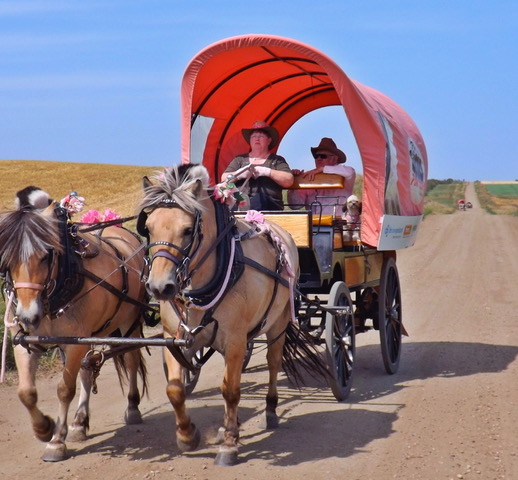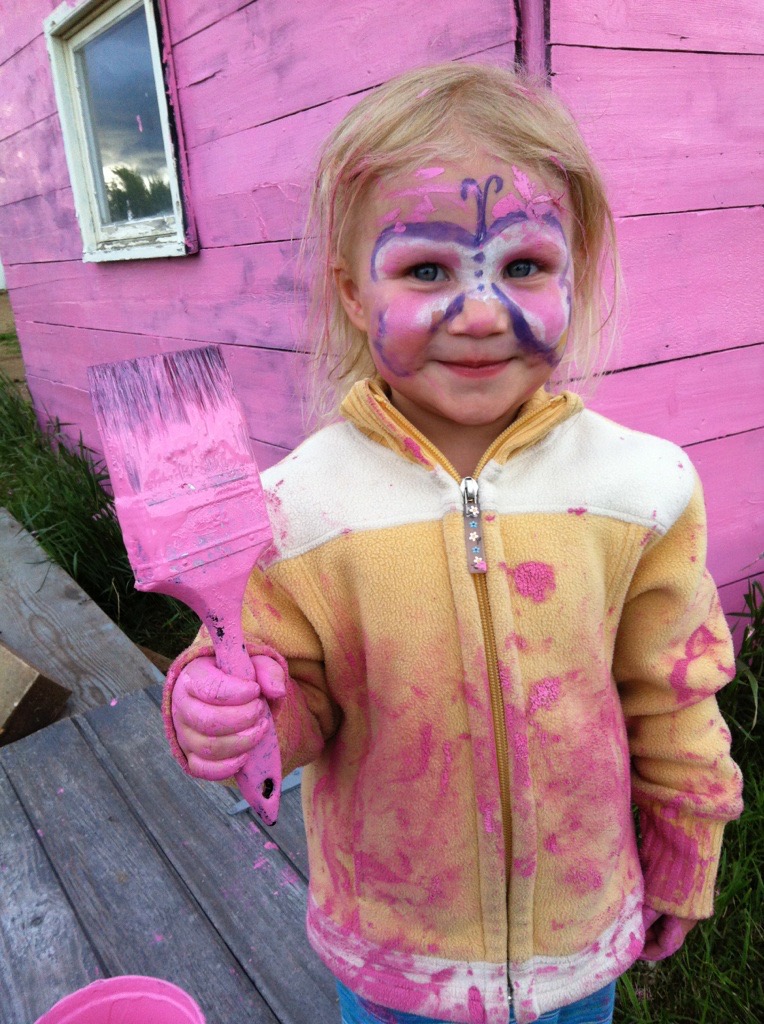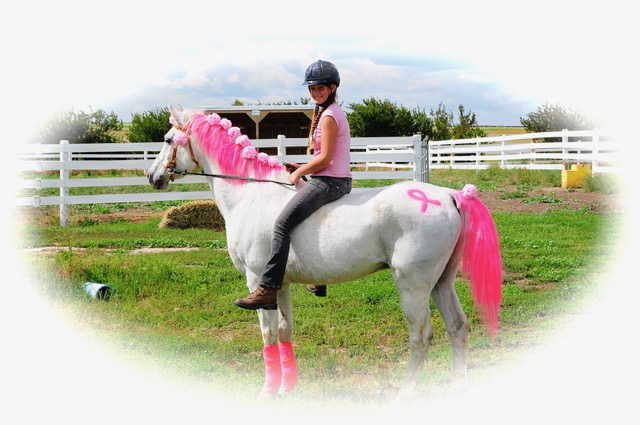
Jane Hurl drives her team of horses as part of Wild Pink Yonder - an annual fundraiser for breast cancer research.
In June of 2009, Jane Hurl was broken, but not bowed. Caught up in a wreck with a team of horses she had been driving, Hurl laid in her hospital bed with a back broken in five places, her hip broken in three, and a fractured left leg.
In only a month she was due to set off on a 23-day, 500-kilometre trail ride as part of an ambitious effort to raise money for breast cancer research. With a long recovery ahead, it no longer appeared possible to Hurl's friends and family who gently suggested her plan be pushed back for a year. Despite their best intentions, the breast cancer survivor known for her headstrong determination would have none of it.
"I said, 'My ride has to go ahead. If it doesn't go ahead this year, it will never, ever go,'" recalled Hurl from her home in Lamont, Alberta. "So I convinced my son to give up his job and take this ride for me."
In July, several horseback riders set out on the inaugural Wild Pink Yonder trail ride, carrying Hurl's wishes with them. Once just an ambitious dream, the ride became reality that day and has since become one of the most instantly recognizable cancer fundraisers in Alberta. In 2017, nine years later, Hurl-the founder, CEO and trail boss for Wild Pink Yonder-has been honoured with a National Philanthropy Award for her vision and drive.

"Everybody told me I was crazy and that nobody would pay to ride with me. And besides which, that visiting 23 towns and driving 500 kilometres was just ridiculous. It was bound to fail. Well, so far it has failed to the tune of about $960,000," said Hurl.
"Jane is a force of nature," said David Eisenstat, current chair of the Department of Oncology and former co-director of the Cancer Research Institute of Northern Alberta who has worked with Wild Pink Yonder to distribute the funds it raised. "She has a very outgoing personality. Larger than life. She's not necessarily the biggest person but those riders really respect her leadership. She's quite something."
Thinking pink
The vision for Wild Pink Yonder didn't form until 2008. Hurl and her step-daughter had both been diagnosed with breast cancer in 2005, and treated the following year. By 2008, Hurl was in remission and looking for a way to give back to the health-care system that had treated her so well.
"I didn't want to do something small. I didn't want to go and walk in one of the walks. Besides which, I've got two fake hips and a bad back, so that was out of the question. And I've always been a horse nut, so I decided that I would organize a trail ride," said Hurl. "It actually started off as a wagon train, because I figured the best signage for this-something that would stand out in people's minds-would be a pink covered wagon. It kind of grew from there."
"Everybody told me I was crazy and that nobody would pay to ride with me. And besides which, that visiting 23 towns and driving 500 kilometres was just ridiculous. It was bound to fail. Well, so far it has failed to the tune of about $960,000." -Jane Hurl
What followed was nine years of riders crisscrossing rural Alberta on horseback in the name of breast cancer research. When Hurl wasn't driving a wagon or riding a horse in the summer, she was organizing destinations for Wild Pink Yonder to visit the following year. Dozens of communities embraced the vision, painting their town pink and raising money in anticipation of Wild Pink Yonder's visits.
"The winner got a free music concert to do with as they wished and beautiful highway signs that declared their town to be the Pinkest Little Town in the West that year," said Hurl. "The towns jumped all over it and had a blast and raised a lot of money. Our slogan was, 'Small towns can make a big difference.'"
Many of Hurl's brightest moments came when her riders reached a community. They would decorate themselves and their horses in pink outfits, glitter, streamers and paint, proudly riding through the town on parade. Wherever the pink parade went, crowds gathered.
"Everybody was waving to the people and the people were waving back. It was really neat," said Hurl. "We had one little girl who had a beautiful white Arabian horse and she would do his mane and his tail in pink and then put pink polo wraps around his legs. I think he was probably the most photographed horse in Alberta."
"I realized as I was going along that a big part of the value of going to these small towns was the awareness that we could raise. In each community I made a point of looking for a woman [in the crowd] who was 50 to 70 years old, and I would point to her and say, 'I had my mammogram this year. Did you?' Some of them would say, 'Yep.' Others would be embarrassed. But it made them think about it."
Why she rides
There were also low points-both emotional and physical. In 2010, Hurl was on day six of the trail ride when she was told her step-daughter had lost her fight with breast cancer. With a heavy heart she continued on in hopes of making a difference. In 2014, Hurl was riding under a bridge when a passing transport truck shook the structure causing her horse to spook, and unseating her. Hurl spent 10 days in hospital with a broken leg, but once discharged, jumped in her motorhome to catch up with the ride and help as best as she could on crutches.
While there were setbacks along the way, Hurl made certain that none would stop her from following through with her goal.
"I know throughout my step-daughter's whole ordeal, she was terrified. Terrified. And I now have four little granddaughters and I don't want that for them. It just about brings me to tears to think about my little granddaughters having to ever deal with that," said Hurl. "It's up to those of us who are here now and able-bodied to do whatever is necessary."
"In each community I made a point of looking for a woman who was 50 to 70 years old, and I would point to her and say, 'I had my mammogram this year. Did you?'" -Jane Hurl

Hurl's hope for her granddaughters' future is both a vaccine and a cure for breast cancer. In 2016, she began directing the funds raised for breast cancer research to the University of Alberta's Cancer Research Institute of Northern Alberta (CRINA). To date, Wild Pink Yonder has funded two grants for CRINA researchers Katherine Fields and David Brindley. Fields is exploring the role of nutrition in cancer and survival while Brindley is searching for treatments that might improve existing chemotherapies and radiotherapy for breast cancer.
Hurl says knowing how the money is being used gives her and the Wild Pink Yonder riders peace of mind.
"I can say, 'This is where it went. These are the researchers. This is what they are doing.' I think it helps give us and the researchers validity."
For the scientists, the support of Wild Pink Yonder and organizations like it is invaluable- allowing them to get projects off the ground, generate results and relay them into added support from large granting organizations.
"It's so important because many of [them] that are present in Alberta have cut back funding severely for what I would call discovery research," says David Brindley, a professor of biochemistry at the U of A that benefits from Wild Pink Yonder's support. "You know these smaller organizations are some of the only ones that are really putting money into discovery research at the local level."
"I think these small grants that are contributed by Wild Pink Yonder will really help us to get this work up and running," added Eisenstat. "And these investigators are not shy. They will apply for national and international funding. The local funding gives them that head start on moving their projects forward."
The path ahead
 By the end of 2018, Hurl expects Wild Pink Yonder will surpass $1 million in money raised for breast cancer research. She fully credits the work of her riders and the communities they have visited together over the years for making her vision a reality.
By the end of 2018, Hurl expects Wild Pink Yonder will surpass $1 million in money raised for breast cancer research. She fully credits the work of her riders and the communities they have visited together over the years for making her vision a reality.
"I feel it shouldn't be me getting this award. It should be all my riders and all my towns," said Hurl, noting her shock when she was given the news. "It was my harebrained idea but everybody else raised all the money."
By the time Wild Pink Yonder hits the $1-million mark, Hurl will be 69 years old. She's uncertain how much longer she'll be able to handle full days in the saddle and is now cooking up plans for a new fundraiser with a little less work involved-a series of car shows across Alberta called Giving the Gears to Cancer.
While Hurl is shifting gears herself, she has no plans to call off Wild Pink Yonder just yet.
"I don't know if I'll be riding six to eight hours a day anymore," said Hurl with a laugh, reflecting on her future. "Mind you, then I'll just stay in camp and do the cooking."